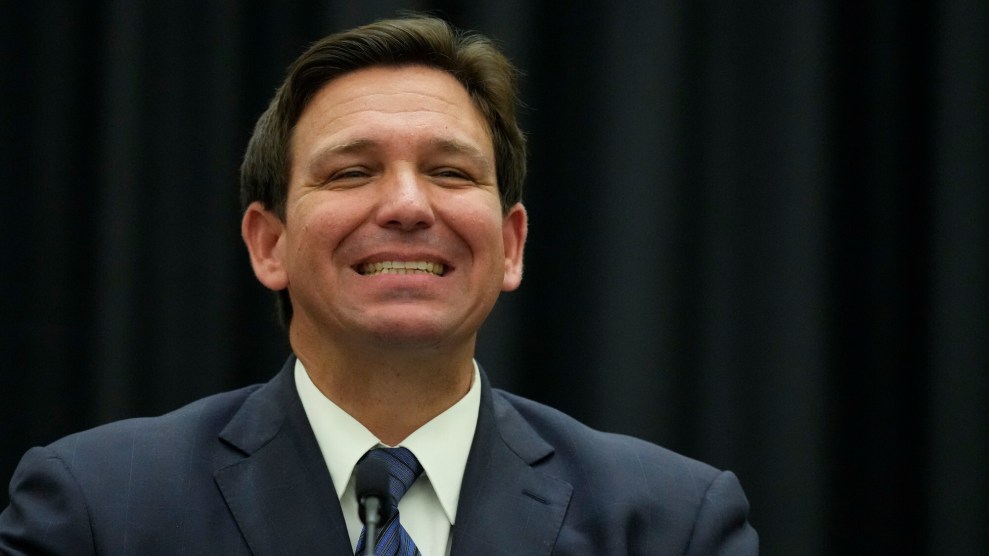
Mother Jones illustration; Paul Hennessy/NurPhoto/ZUMA
Update, Nov. 4: The Florida Boards of Medicine and Osteopathic Medicine approved language for a proposal to ban gender-affirming care for minors. Under the proposed rule, doctors may not prescribe puberty blockers, hormone, or hormone antagonists to minors diagnosed with gender dysphoria. There are a couple of important exceptions: Minors currently receiving these treatments will be allowed to continue them. And the Board of Osteopathic Medicine will allow DOs at state universities to provide gender-affirming treatment to new patients as part of approved clinical trials.
“With young lives on the line, another state agency has placed the political ambitions of Ron DeSantis over its duty to protect Floridians,” says Nikole Parker, Equality Florida’s director of transgender equality, said in a statement.
The proposed rule now goes to a 21-day public comment period, and the boards could choose to conduct more workshops on it, according to Equality Florida press secretary Brandon Wolf. There will be at least one more official meeting and vote before the rule goes into effect. LGBTQ advocates are also likely to request an administrative hearing on the rule, which could slow it further, says Nathan Bruemmer, the LGBTQ consumer advocate at the Florida Department of Agriculture and Consumer Services.
During its Friday meeting, the board ended public testimony on the rule early, and security ushered opponents out of the hearing room. “I’m heartbroken about the result, Bruemmer says, “and I’m heartbroken that folks who wanted to be heard were silenced again.”
When Emile Fox learned that the Florida Board of Medicine, the rule-making body for doctors in his state, was considering banning transgender medical care for youth, he thought about his own transition. Fox, a 27-year-old barista in Orlando, says he had suffered serious mental health problems throughout his teen years and into young adulthood. But once he came out as trans in his mid-20s, he experienced what he calls “that click.” Soon, under the supervision of a physician, he began a course of testosterone; when he heard his voice drop, he remembers thinking, “I didn’t realize I was missing.”
He often wondered how much anguish he might have saved had if he had transitioned at a younger age. But the proposed medical board rule would wipe out that option for Florida’s trans youth—and any doctors who helped them would risk losing their licenses. So in August, Fox traveled to Fort Lauderdale to plead with the board to preserve gender-affirming care for Florida’s teens. “I don’t think it’s the state of being transgender that causes mental illness—I believe it’s the general lack of support, social acceptance, and medical treatment,” Fox told the board, his voice tight with nerves, in a crowded conference room evenly divided between supporters and opponents. “Transgender people thrive and live healthier lives when they receive gender-affirming care. I’m proof of this.”
That day, the Florida board voted to move forward with crafting state rules for the treatment of gender dysphoria in youth—which can include puberty blockers for pubescent children; hormone therapy for adolescents; and, infrequently, gender-confirming surgeries. (Such surgeries almost exclusively limited to “top surgeries,” like breast reduction, for older teens.) The text of Florida’s forthcoming rules has not yet been made public, but LGBTQ advocates are bracing for the board to pass a proposal in the coming weeks. If they ban gender-affirming care for youth outright, as the state surgeon general has asked them to do, it would be the first trans health care ban in the country to come from a state medical board. “It’s shocking that a state board of medicine would propose banning care for youth that is medically necessary and age appropriate, and is supported by every major medical association in the United States,” says Sarah Warbelow, legal director for Human Rights Campaign.
After years of bathroom bills and attempts to ban trans girls from school sports, a flurry of Republican legislation is now going after trans kids’ health care, with Republican lawmakers in four states passing bills banning gender-affirming medical care for minors over the last two years. Similar legislation have been introduced in some 20 other states and in Congress, where far-right Rep. Marjorie Taylor Greene of Georgia is championing a bill that would make providing such care punishable by up to 25 years in prison. Judges have so far blocked the widest-reaching laws, in Alabama and Arkansas. But in late September, the Oklahoma legislature passed its own version of a blanket ban, preventing hospitals from accessing federal relief money unless they agree not to provide minors with gender-affirming medical treatments.
In Florida, lawmakers have rejected a gender-affirming care ban every year since 2020. That’s a problem for Republican Gov. Ron DeSantis, who spent much of the last year making political hay off laws that target LGBTQ kids. In recent months, DeSantis—who is widely believed to be preparing a presidential run—has ramped up the anti-trans rhetoric in an apparent appeal to his party’s base, with its mix of traditional religious conservatives and culture warriors concerned about “woke ideology.” In fundraising messages this cycle, the governor has repeatedly blustered that kindergarteners were being “indoctrinated with transgenderism”; in public appearances, he has falsely claimed that surgeons were operating on young children. “When they say ‘gender-affirming care,’ what they mean a lot of the times is you’re castrating a young boy, you’re sterilizing a young girl, you’re doing mastectomies for these very young girls,” DeSantis lied to a right-wing podcast host in May. “I’m fighting to protect our children,” the governor promised in an email to supporters later that month. At an August press conference, he added an applause-drawing, headline-grabbing line: “I think these doctors need to get sued for what’s happening.”
So to carry out his agenda on transgender health care, the governor has needed to go around lawmakers and take a unique line of attack: Weaponizing state agencies, including the medical board, to do the dirty work for him.
The opening salvo in Florida’s bureaucratic war on trans health care came in April, the month after the Biden administration declared that it would defend young people’s access to such care as a matter of civil rights. DeSantis’ handpicked surgeon general, Joseph Ladapo—a critic of Covid vaccines, masks, and quarantines—issued a memo advising doctors to withhold medical treatments like hormones and puberty blockers from youth with gender dysphoria, claiming that there wasn’t enough “conclusive evidence.” Even non-medical measures, like changing names, hair, and pronouns should “not be a treatment option,” Ladapo wrote. “The surgeon general did a great job,” DeSantis later commented.
The guidance flew in the face of medical consensus, including the positions of the American Medical Association, American Academy of Pediatrics, American Psychiatric Association, and Endocrine Society, which all say that young people with gender dysphoria fare better with treatment that affirms their identities. Ladapo’s one-pager wasn’t binding, but medical providers and LGBTQ advocates say it set off alarms. “Our friends on the ground in Florida said, ‘This is probably heralding something,’” recalls Carl Charles, a Lambda Legal attorney.
That instinct was right. The same day that Ladapo produced his memo, Florida’s Agency for Health Care Administration, which oversees the state Medicaid program, opened an inquiry into whether Medicaid should cover gender-affirming care. A few weeks later, AHCA launched a new section of its website, branded “Let Kids be Kids”—and on it was a lengthy report concluding gender dysphoria treatments are “experimental” and did not meet “generally accepted medical standards.” To back up its findings, AHCA commissioned papers from such sources as Quentin Van Meter, a pediatric endocrinologist and the president of a fringe group of doctors who oppose conversion therapy bans and same-sex marriage. Another analysis came from Patrick Lappert, a plastic surgeon and Catholic deacon who delivers religious lectures against what he terms the “transgender treatment industry.” (A North Carolina court recently found that Lappert was “not qualified to render opinions about the diagnosis of gender dysphoria.”)
“These agencies are manipulating what are supposed to be the processes of government that are there to protect us,” says Nathan Bruemmer, the LGBTQ consumer advocate at the Florida Department of Agriculture and Consumer Services. “If you look at the report, and what’s on AHCA website, and what’s mentioned in the public hearings, it’s the same bad research.”
Ten academic researchers whose work was also cited in the AHCA report told Vice News it misrepresented their data, which should not be construed to justify denying gender-affirming care to kids. “The report ignores solid scientific evidence and instead repeats discredited claims, cites to sources with no scientific merit, and engages in unfounded speculation based on stereotypes rather than science,” a group of Yale University doctors and psychiatrists concluded in an independent assessment.
AHCA forged ahead anyway, finalizing a regulation in August that banned Medicaid reimbursements for puberty blockers, hormones, and gender-affirming surgeries—no matter the age of the recipient. The rule cut off potential or current coverage for an estimated 9,000 low-income trans adults on Florida Medicaid, along with an unknown number of children, according to Charles, the Lambda Legal attorney, who’s now on a team representing four trans Medicaid recipients and their families in a lawsuit against the state. The ban caused his 12-year-old clients to lose access to puberty blockers, leading to “literally irreversible changes to their bodies,” Charles says. Gary Howell, a psychologist who works with trans youth and adults in Florida, says the decision harmed the mental health of his patients, some of whom had scheduled treatments canceled or began to consider leaving the state. “It’s probably the most frightening time that I’ve seen in my career,” Howell says. “I had several patients even within that first week, especially my trans youth, who were reporting suicidal ideation.”
In August, Jason Weida, a former Donald Trump appointee who now works in the AHCA office, appeared at an event hosted by the Alliance Defending Freedom, one of the nation’s most influential anti-LGBT legal groups, to gloat about the report. “It’s thorough, it’s documented, it’s the exact quality evidence so often lacking from the Biden [Health and Human Services department],” ADF’s state legislative director gushed at Weida. “It ought to be something that ought to serve as, perhaps, a model for other states.”
“Thanks to the leadership of Gov. DeSantis, we have been able to take a parents’ rights approach to legislation over the last couple of years,” Weida responded. “Just stay tuned for more to come out of Florida.” Within three weeks, he was promoted to AHCA chief of staff.
The day AHCA published its report, Surgeon General Ladapo picked up the baton again, asking the state medical board to prohibit doctors from giving minors puberty blockers, hormones, or surgeries as part of gender dysphoria treatment. The board agreed to consider making a rule—and put it on the agenda for their next meeting.
That’s how Fox came to stand before medical board members this August, describing to them how gender-affirming care had turned around his life. Around him, supporters of the surgeon general’s petition donned big, round stickers emblazoned with the logo of AHCA’s “Let Kids Be Kids” website. “Back in my day, men were men, women were women,” one declared at the microphone. Van Meter himself appeared and repeated the debunked myth that transgender identity is a contagion spread on the internet.
Yet there were others who pushed back. Kaleb Hobson-Garcia, a senior at a Florida State University, told the board how getting the support to transition in his teen years had allowed him to thrive. Michael Haller, chief of pediatric endocrinology at the University of Florida, explained that the state’s gender clinics already followed long-established treatment standards from the World Professional Association for Transgender Health. And state Rep. Anna Eskamani, whose district includes the Pulse nightclub, pointed to the national rise in anti-trans rhetoric. “I understand the objective nature of this board, which I appreciate, but the reality is we are not here in a vacuum,” Eskamani insisted. “This is coming from the governor.”
Medical boards are indeed considered nonpartisan entities, issuing licenses to doctors and disciplining those who violate state laws or professional standards. But their members—mostly doctors, plus a handful of consumer representatives—are almost always appointed by governors. Two-thirds of the current Florida board have donated at least $1,000 apiece to Republicans, according to a Mother Jones analysis of campaign finance data. Of the 15 board members, 4 have given DeSantis more than $15,000 each. Hector Vila and Zachariah Zachariah, the only doctors whose board membership predates DeSantis’ governorship, have each donated at least $20,000 to his reelection committee.
And in June, two months after the Ladapo memo declaring a war on trans kids, DeSantis added a handful of new members to the board—including Patrick Hunter, an Orlando pediatrician who has emerged over the a last year as a vocal critic of gender-affirming care for children. Last winter, Hunter penned a letter to the editor of the medical journal JAMA Pediatrics critiquing the practice of gender transitions for youth; in May, he was hired as an expert witness by Alabama officials being sued over that state’s gender-affirming care ban.
“For many of us that are aware of what’s happening, and monitoring and working and advocating to stop this speeding train from going down the track, of course we thought this was a predetermined process,” Bruemmer says. “But you got to just hope it’s not.” Howell, who shares an LGBTQ identity with his patients, says hope is his biggest struggle these days. “One of the challenges, as psychologists, is that we have to instill hope in the patients that we work with,” he says. “It’s hard when I don’t really have the same level of hope I would want to have, that things are going to get better. Because I’m seeing the reality unfold around us.”
Fox, who has insurance through his job at Starbucks, underwent top surgery in September. Now, he jokes, no matter what rules the medical board passes, “there’s nothing they can do about my chest. They’re gone.” On the day he sat down to speak with me over Zoom, he’d just taken off his bandages. He was marveling at the absence of discomfort, trying to put feelings into words. “People make their own family,” he explained, tentatively. “Whether that’s their spouse, their children, their group of friends, their coworkers, there’s that moment where you feel like you’re surrounded by your community and your family, and it clicks and you feel like you fit in. This is a similar feeling,” he said. “But it’s entirely with yourself.”
















